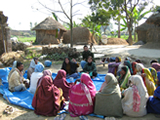EPE Values - Participatory Decisionmaking
 Participatory decisionmaking is a value concept with a twofold emphasis. On the one hand, it measures to what extent the right of individuals and groups to be consulted in matters that will affect their lives is honored and, on the other, the extent to which they engage in social action that promotes the common good locally, nationally, and globally. In a society that values participatory decisionmaking, authentic opportunities are provided and structures devised to seek the input of concerned stakeholders in matters pertaining to the social and ecological good. Moreover, this input is taken into account in the final decisionmaking. At the same time, participatory decisionmaking is reflected in citizens’ engagement in these opportunities and in the initiatives they take to organize social action to protest violent, unjust, ecologically unsustainable practices. In other words, it is a value concept that contributes to the development of policies and practices that are nonviolent, ecologically sustainable, and socially just for the present and future generations of the Earth community, both human and other living species, standing in a means-end relationship to these values.
Participatory decisionmaking is a value concept with a twofold emphasis. On the one hand, it measures to what extent the right of individuals and groups to be consulted in matters that will affect their lives is honored and, on the other, the extent to which they engage in social action that promotes the common good locally, nationally, and globally. In a society that values participatory decisionmaking, authentic opportunities are provided and structures devised to seek the input of concerned stakeholders in matters pertaining to the social and ecological good. Moreover, this input is taken into account in the final decisionmaking. At the same time, participatory decisionmaking is reflected in citizens’ engagement in these opportunities and in the initiatives they take to organize social action to protest violent, unjust, ecologically unsustainable practices. In other words, it is a value concept that contributes to the development of policies and practices that are nonviolent, ecologically sustainable, and socially just for the present and future generations of the Earth community, both human and other living species, standing in a means-end relationship to these values.
-
Do citizens have a right to be consulted by their elected leaders in matters pertaining to their welfare and the common good? including the vulnerable and the powerless? Why? Why not?
-
What responsibilities do governments and leaders of organized groups have to involve citizens in decisionmaking? Must the participation of the affected and powerless be sought ?
-
What avenues should be provided to ensure the input of all? How should their effectiveness be measured?
- What responsibility does a citizen have to work for the common good? How should they respond to opportunities to participate in decisionmaking provided by their leaders? And, what should a citizen do when confronted with social, economic, and/or ecological crises within his/her community? nation? Other nations? Is civic action in these crises a moral responsibility?
